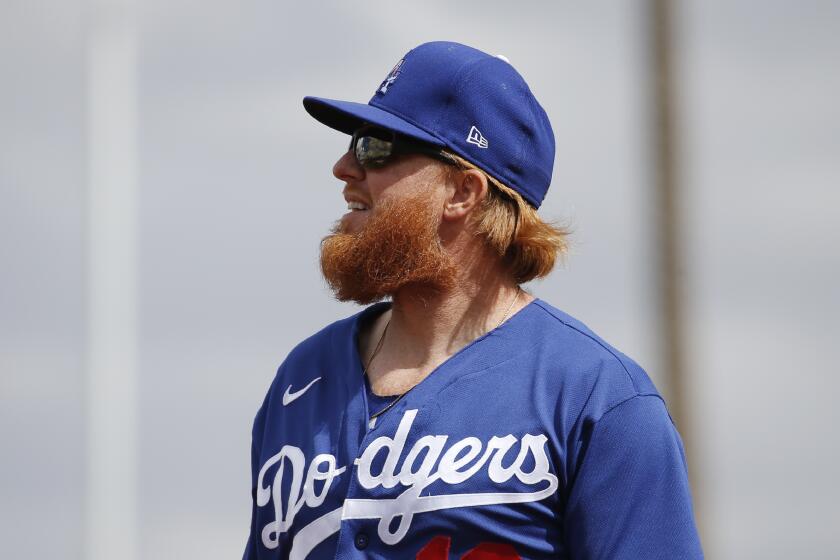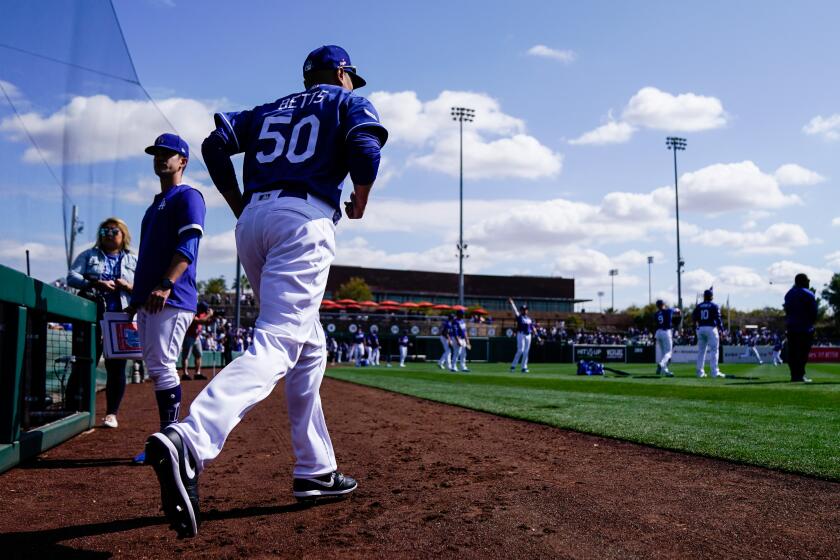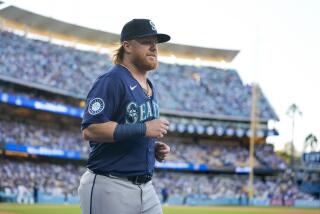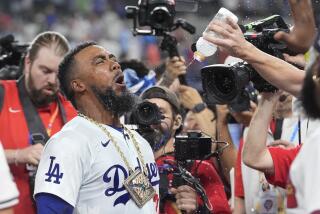Justin Turner’s home run derby idea is already a smashing success in one league
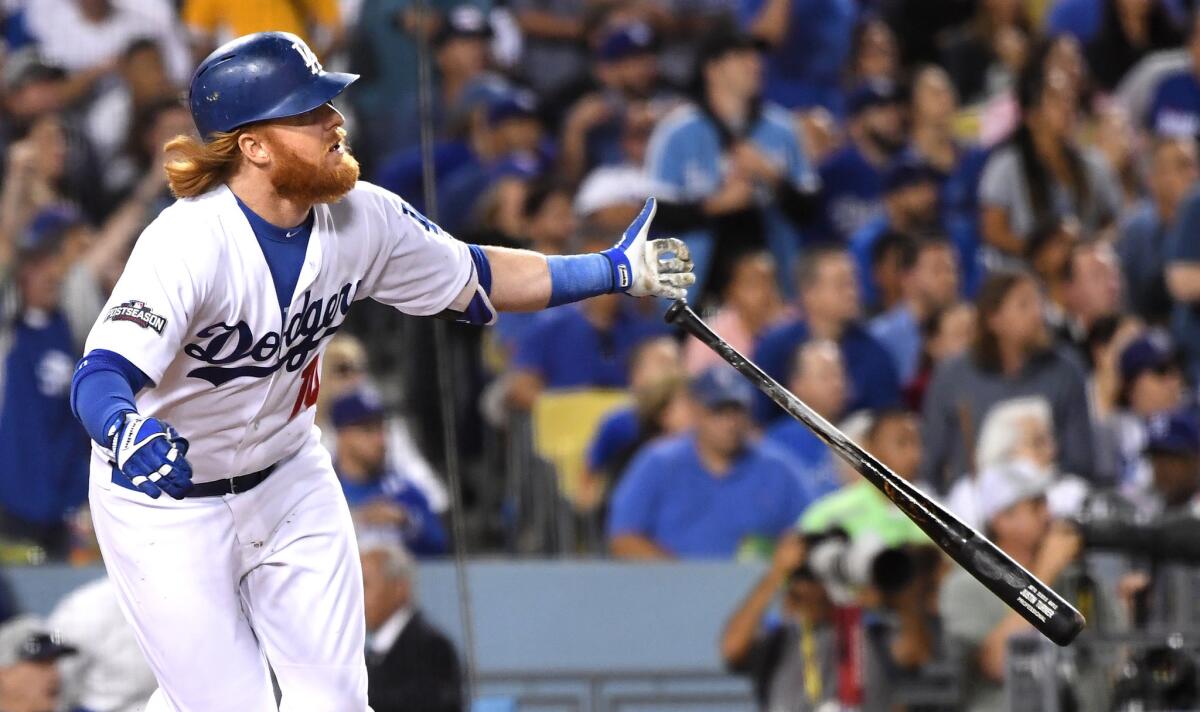
- Share via
Last week, Justin Turner, the veteran Dodgers third baseman and proud descendant of the old school, did the unthinkable: He suggested Major League Baseball make a radical rule change.
That was the essence of the headlines when Turner said on television MLB should have a home run derby decide games tied after 10 innings and defended the idea on Twitter the next day.
Of course, he emphasized that the modification would be for only the 2020 regular season — if there is a season — because it probably would feature a condensed schedule with sparse off days and regular doubleheaders. Such a schedule would be daunting for pitchers. Add a 13-inning game here and there, and injuries could mount. Pitching staffs could be decimated.
That disclaimer was disregarded by some who found Turner’s suggestion too extreme. A home run derby in a regular season game? Is this hockey and its penalty shootouts? Hard pass.
The Dodgers’ Justin Turner shares his thoughts on his viral ‘Tiger King’ tweet and how he feels about the latest idea to save the MLB season.
B.J. Neverett was in that dissenting camp 3 1/2 years ago. The former manager of the Nashua Silver Knights, one of seven teams in the Futures Collegiate Baseball League, is a traditionalist. He loves the strategy within the game, and he welcomed the challenge of navigating extra innings. So when the FCBL owners instituted a rule after the 2016 season to have a home run derby decide regular season games tied after the 10th inning, he wasn’t thrilled.
“It was something that, when they first voted on it,” Neverett said, “I was totally against it.”
Neverett, the brother of Dodgers broadcaster Tim Neverett, stepped down as manager of the Silver Knights at the end of last season after eight years. Not because he hated the home run derby that much, but because the physical education teacher wanted summers off again. On the contrary, the home run derby grew on him. He found the event exciting — except when he was throwing the pitches.
“I would get Steve Blass disease when I got out there to throw [in the] home run derby, where everyone is staring down your back and there’s no cage behind the hitter,” Neverett said. “I couldn’t throw it over the plate. I froze right up.”
Founded in 2010, the FCBL is a summer league designed to give New England college players a chance to play strong competition, a couple of rungs below the renowned Cape League down the road. The 56-game schedule begins Memorial Day and ends the first week of August. Teams have 35-man rosters. And to entice colleges into feeding them talent, they enforce strict pitcher usage rules to limit wear-and-tear on arms that had already amassed innings during the college season.
The 2016 season tested the limits. Clubs were crushed by long games that year. One team, the Pittsfield Suns, had a game stopped in the 16th inning, took a bus home, got back on a bus for another game the next day, and resumed the postponed game later in the season. That game ended up lasting 21 innings and their next game also went extra innings.
“It was getting to a point that position players started to pitch, which college coaches aren’t a fan of,” former FCBL commissioner Chris Hall said. “So we wanted to eliminate that as quickly as we could.”
Would bringing back MLB amid the coronavirus crisis be a morale boost for a quarantined nation or an audacious grab of medical resources? Or both?
The league’s owners voted on the home run derby that fall.
Each team is given three minutes with two timeouts. Up to three batters can participate — they can switch on the fly or after a timeout, if they switch at all. Any member of the team — a coach or a player — pitches from behind an L screen, but a cage isn’t placed behind the hitter. Players sit along the baselines to root on their teammate and chirp at the opposition. On the field, it resembles the home run derby MLB holds every summer.
“Across the board, I thought it was a huge success,” Hall said. “We accomplished what we wanted to: get everybody home on time, keep fans in the ballpark a little bit longer, and save pitchers’ arms.”
There were growing pains. Because the league had only two umpires for each game, one would stand behind the plate keeping time and the other in the outfield ruling if the ball traveled over the fence. Two issues emerged: The ballparks weren’t well lit so it was difficult to track balls and pitchers were allowed to feed the hitters rapid fire. The combination meant the field umpire had difficulty ruling on some balls. A change was implemented to have pitchers wait until the ball landed before throwing the next pitch.
The biggest flaw arose with the hockey-style points system installed to determine the standings. Teams earned two points for wins and one point for reaching a home run derby, even if they lost. It proved problematic when one team, Martha’s Vineyard, didn’t make the playoffs despite having more wins than another team, Worcester, because it finished with one fewer point. The points system was scrapped after the 2017 season.
Dieter Ruehle, the organist for the Dodgers and Kings, is having a tough time living through the sports famine, but he has a secret coping mechanism.
“I didn’t think it was that great of an idea until I saw a home run derby,” said Joe Paolucci, who replaced Hall as commissioner. “It creates a really exciting atmosphere for the 15 minutes it takes. Getting these games over quickly and getting these kids home is really important, and the home run derby for us has been incredible, I think. As long as I’m involved in the league, we’re going to continue to do this.”
By last season, Neverett said, the home run derby affected how he constructed his roster and managed games. Before the 2019 campaign, he and his staff recruited a player specifically to launch home runs. Occasionally, when a home run derby was likely, Neverett removed the player from the game so he could prepare in the batting cage (players removed from games can hit in the derby).
The derby is a wrinkle that might alarm purists, but it hasn’t happened very often. Neverett said his team didn’t decide a game with a home run derby in 2017. They went 0-4 in derbies in 2018 and lost their first one in 2019 before winning three in a row. So Nashua went 3-5 in home run derbies across more than 150 games. Last year, the league had nine games decided by a home run derby.
In 2019, the Dodgers had seven games — just 4% of their regular season schedule — go beyond the 10th inning. The longest lasted 13 innings. They went 3-4 in those games.
Four percent isn’t much, but just the thought of Turner’s suggested — and temporary — plan is enough to turn off some baseball people. Neverett gets it. He was one of those screaming blasphemy. But he quickly realized the idea, as sacrilegious as it first seemed, was a good one for the FCBL. And he’s convinced Turner’s proposal would at the very least be entertaining at the highest level in these unprecedented circumstances.
“I don’t know how the players would take it, but it would be unbelievable for the fans,” Neverett said. “I don’t know how they’d set it up or anything, but it would be pretty amazing.”
More to Read
Are you a true-blue fan?
Get our Dodgers Dugout newsletter for insights, news and much more.
You may occasionally receive promotional content from the Los Angeles Times.

